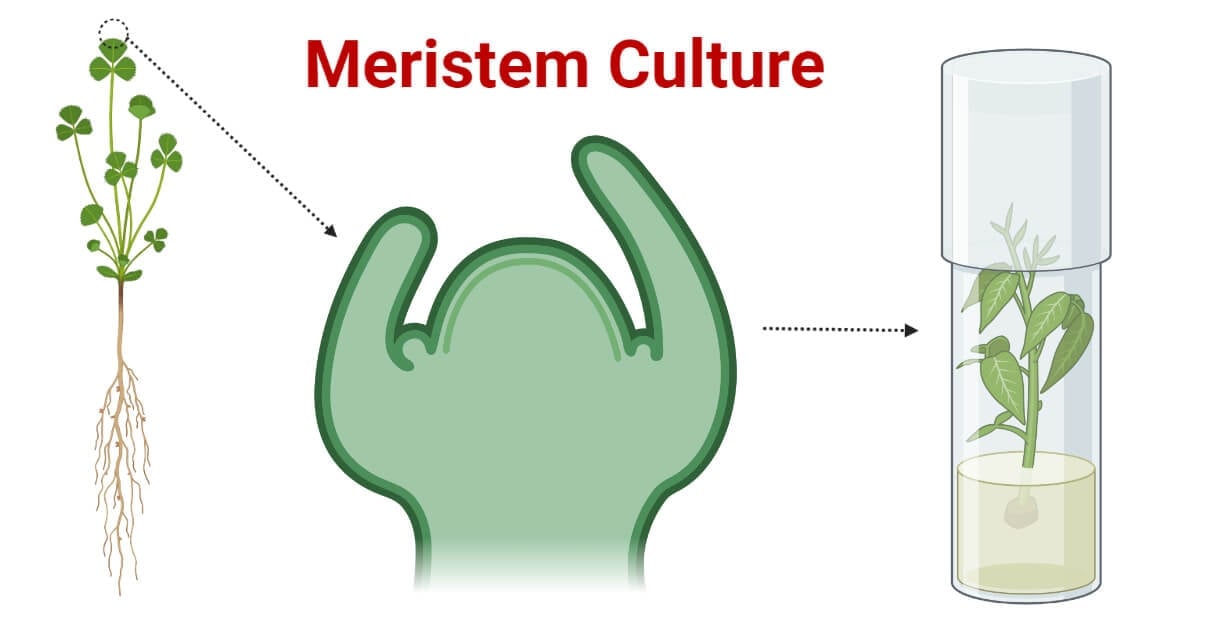Meristem culture is a tissue culture technique that helps in the isolation and culture of apical meristem tissue from a plant. The apical meristem is the tip of a plant that contains undifferentiated cells capable of differentiating into various plant tissues.
- Meristem culture involves the isolation and culture of apical meristem tissue from a plant, which contains undifferentiated cells that can differentiate into various plant tissues.
- The technique produces virus-free plants and propagates complex or slow-to-propagate plants.
- Meristem culture can have large numbers of identical plants with genetic uniformity.
- The resulting plantlets can be transferred to soil or another growing medium to grow into mature plants.
- Meristem culture is an essential technique in plant biotechnology with many applications in agriculture, horticulture, and plant breeding and improvement.

Interesting Science Videos
Meristem Culture Technique
Tissue culture, including meristem culture, is significant in producing healthy plants and preserving wide varieties. The culture technique involves:
- We are isolating the apical meristem tissue from a plant.
- Sterilizing it.
- We are placing it on a nutrient-rich agar medium that contains plant growth regulators.
The plant growth regulator stimulates the growth and differentiation of the meristem tissue into shoots and roots, forming small plantlets. After the platelets are developed, they are transferred to soil or another growing medium. But the process is more challenging when you don’t have experience.
Moreover, it will take months to create or develop your procedure, requiring mixing different types and concentrations of chemicals to induce tissue division and differentiation.
Some of the steps of the meristem culture technique:
Isolation and sterilization of apical meristem tissue
- The apical meristem tissue is carefully excised from the plant using a scalpel or razor blade.
- The tissue is sterilized using a series of disinfectants to eliminate any surface contaminants that may interfere with the growth of the culture medium.
- The meristem tissue is usually small, typically no larger than a few millimeters.
Culture of meristem tissue on nutrient-rich medium
- The sterilized meristem tissue is placed on a nutrient-rich agar medium that contains plant growth regulators, such as cytokinins and auxins, to promote growth and differentiation.
- The medium typically comprises inorganic salts, vitamins, sugars, and other nutrients such as amino acids, coconut milk, and activated charcoal.
Growth and differentiation of tissue into shoots and roots
- The meristem tissue grows and differentiates into shoots and roots, forming small plantlets.
- The plantlets are transferred to a fresh medium to promote growth and development.
Transfer of resulting plantlets to soil or other growing medium
- After the plantlets have developed, they are transferred to soil or another growing medium for growth and development.
- The small plantlets are sensitive, so they should be adequately cared for.
Advantages of Meristem Culture
- Meristem culture produces virus-free plants by isolating and growing meristematic tissue free of viral infections.
- It propagates plants that are difficult or slow to reproduce by conventional methods, which is especially useful for endangered species.
- Large number production of identical plants with genetic uniformity ensures plant quality and reduces the time and cost of plant propagation.
- Meristem culture can help maintain genetic uniformity, which is essential for research and breeding.
Applications of Meristem Culture
Agriculture
- Meristem cultures are essential in agriculture to propagate high-yielding, disease-resistant crops.
- The technique can produce virus-free planting material, increasing crop yield and quality.
- Meristem culture can also stimulate large-scale production of crops for various purposes.
Horticulture
- Meristem culture helps to propagate plants with desirable traits, such as ornamental plants and fruits.
- It also produces plants that are difficult to reproduce by cutting or seeding.
Plant breeding and improvement
- Meristem culture helps in plant breeding and improvement to produce plants with desirable traits, such as disease resistance and high yield.
- The technique can maintain genetic uniformity and have large numbers of identical plants for screening and evaluation.
- Meristem culture can be essential in specific genetic modifications, such as introducing or deleting a foreign gene.
Conclusion
Meristem culture is a vital plant biotechnology technique that allows for the propagation of high-quality plants with desirable traits, the production of virus-free planting material, the conservation of endangered plant species, and the production of genetically modified plants.
The resulting plantlets can then be transferred to soil or other growing medium. Meristem culture has many applications in agriculture, horticulture, and plant breeding and improvement and is a valuable tool in advancing plant biotechnology.
References
- https://biolres.biomedcentral.com/articles/10.1186/s40659-017-0125-8
- https://www.plantcelltechnology.com/blogmeristem-culture-definition-procedure-benefits-and-applications/
- https://www.sciencedirect.com/topics/immunology-and-microbiology/meristem
- https://experiments.springernature.com/articles/10.1385/1-59259-583-9:115
- https://www.philipharris.co.uk/product/biology/genetics-and-evolution/meristem-tissue-culture-medium-pack-of-10/b8a23322https://www.scirp.org/journal/paperinformation.aspx?paperid=104523
- https://agriinfo.in/application-of-shoot-tip-or-meristem-culture-1891/
- https://www.tandfonline.com/doi/abs/10.1080/00221589.1972.11514466
- https://www.scielo.br/j/gmb/a/8bS68T7czM5hQWFW5rdXbmJ/abstract/?lang=en
- https://www.actahort.org/books/78/78_37.htm
